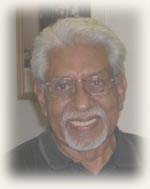The Grapevine Art & Soul Salon

WorldVoices: Ravi Kumar, Host
ABCDs and Cultural Differences
Children of Indian parents who are born in the United States are sometimes, in jest, called ABCDs. ABCD is the acronym for "American Born Confused Desi." Desi means someone from Indian heritage. It is a slight distortion of the word "Desh," which means country (India). The word "confused" is what distinguishes these children. As they grow up, they are confronted with remarkably different cultures and religions. They have to contend with Indian culture at home and American culture at school and at work. And they have to learn to deal with contradictions and tensions as they move between the two. Some of them have never been to India or have only faint memories of a visit a long time back. That is why they came to be called "confused." What is the confusion? That is difficult to define. Not even the ABCDs have the answer, because there is no straightforward answer. But let me try to explain.
Most children in India and of Indian parentage abroad are bilingual. Indian children are expected to be able to speak and understand their native language, the language of the region in India where their parents migrated from. India has around 22 officially recognized languages, and there are numerous vernaculars. People from different regions of India often cannot understand each other except in English, although Hindi is widely understood. This I credit to the Indian film industry, which churns out Hindi films by loads every year. By the way, Indian films have lately become so westernized in their costumes, life styles and social norms that ABCDs find it easy to relate to them. However, Indian parents in a new country expect their children not to forget all about India and their religion. I have seen ABCDs take part in rituals and perform traditional Indian dances and songs without understanding their meanings, but at least, they are helping to preserve the forms.
Indian parents have different social standards for their sons and daughters from the standards generally expressed in American culture. This is very noticeable in the dating scene. Indian boys, although it is frowned upon by parents, may once in a while dare to go on dates. But for daughters, it is almost impossible to do so. Parents expect that the children will grow up and select their marriage partner according to the parents' wishes. Parents may even be keen to find an Indian, either here or in India, for their child to marry. Parents are deeply involved in the selection of a suitable partner. The "suitable" covers status of the family, education level, job, caste, region of family origin in India, height, age, and color (Yes, color! Indians are very color-conscious and prefer light-complexioned brides, even though they themselves may be dark-complexioned). However, most Indians are willing to let a child select his/her partner as long as they have final approval. Parents' approval takes precedence, and the ABCDs are generally willing to follow this tradition. If these children follow an individual urge to seek a soul mate, and the chosen person is from a different culture, the choice is likely to be frowned upon and to cause a great amount of stress among their parents and relatives.
Among ABCDs, cohabiting without marriage, children out of wedlock, and divorces are not common, nor is taking drugs. Indian boys and girls are probably confused as to why they are not allowed to enter situations that would bring about any of these conditions. Family support is so strong and overpowering that it is difficult for children to stray. There are exceptions, of course. There are those who break all the rules and follow their own desires. But they are rare. Yet for both boys and girls in Indian families, the closeness of family and support structures existing in the community social life provide a sense of security, which may contribute to a more disciplined life.
Parents also take a very active interest in the accomplishments of their children, both boys and girls. They take pride in the educational qualifications and jobs of their children and constantly push them to achieve more and do more. It would be hard to find a child of Indian parents in this country who has not got a college degree. Most are engineers, software professionals, doctors, lawyers or successful business men and women.
Recently, I was speaking to a young man born here whose parents had migrated from North India. He said he did not feel confused, as he could go and mix with any crowd of young people and enjoy it. But when it came to marriage, he married a girl from India. In his case the girl was a Muslim and his parents, though orthodox Hindus, allowed him to marry her. But he told me something interesting. He said that when he is at work, everybody considers him to be an Indian, although he was born here. And when he goes to India, everybody there thinks that he is an American. That can be very confusing.
However, the cultural clash that sometimes appears between American and traditional Indian values and standards of behavior tends to reflect extremes. Placing value on freedom, individuality and privacy has been the reason why Americans are in the forefront of innovation. They are allowed to think out of the box. Indian children are expected to go ahead in accomplishments within set rules. Indian parents would not have allowed Steve Jobs or Bill Gates to drop out of high school, and without that freedom to follow their own inclinations, they might not have flourished as innovators and entrepreneurs. At the same time, many of the social problems associated with American culture are a result of freedom and focus on individuality and privacy taken to the other extreme, where restraint and discipline and living by rules are given little value.